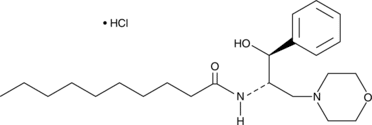Territorial Availability: Available through Bertin Technologies only in France
- Synonyms
- N-[2-hydroxy-1-(4-morpholinylmethyl)-2-phenylethyl]-decanamide, monohydrochloride
- Correlated keywords
- analog analogue inhibit inhibitor cytotoxicity glucosylceramide synthase chirality stereoisomer sphingosine (±)PDMP ceramide cultured cell treatment cellular cycle arrest alkaline cereamidase isomer ?-1,4-galactosyltransferase 6 lactosylceramide neuroinflammation promoter mice mouse chronic autoimmune encephalomyelitis multiple sclerosis MS
- Product Overview:
DL-threo PDMP is a mixture of ceramide analogs that contains two of the four possible stereoisomers of PDMP (Item No. 62595): D-threo-(1R,2R)-PDMP and L-threo-(1S,2S)-PDMP.{11392} DL-threo-PDMP inhibits glucosylceramide synthase by 33 and 48% in MDCK cell homogenates when used at concentrations of 5 and 10 µM.{11341} It reduces the synthesis of glucosylceramide, increases cellular ceramide, and induces cell cycle arrest in vitro.{11342} The ability to inhibit glucosylceramide synthase has been found to reside in the D-threo-(1R,2R) enantiomer.{11393} The D-threo-PDMP enantiomer is also responsible for inhibition of ?-1,4-galactosyltransferase 6 and prevention of lactosylceramide synthesis, which is a promotor of neuroinflammation in mice during chronic experimental autoimmune encephalomyelitis (EAE), a model of multiple sclerosis.{27728} DL-threo-PDMP increases amyloid-? (1-42) (A?42) and A?39 production independent of ceramide metabolism via modulation of ?-secretase activity in HEK293 cells expressing the ?-secretase substrate SC100.{36880} [Matreya, LLC. Catalog No. 1719]
Cayman Chemical’s mission is to help make research possible by supplying scientists worldwide with the basic research tools necessary for advancing human and animal health. Our utmost commitment to healthcare researchers is to offer the highest quality products with an affordable pricing policy.
Our scientists are experts in the synthesis, purification, and characterization of biochemicals ranging from small drug-like heterocycles to complex biolipids, fatty acids, and many others. We are also highly skilled in all aspects of assay and antibody development, protein expression, crystallization, and structure determination.
Over the past thirty years, Cayman developed a deep knowledge base in lipid biochemistry, including research involving the arachidonic acid cascade, inositol phosphates, and cannabinoids. This knowledge enabled the production of reagents of exceptional quality for cancer, oxidative injury, epigenetics, neuroscience, inflammation, metabolism, and many additional lines of research.
Our organic and analytical chemists specialize in the rapid development of manufacturing processes and analytical methods to carry out clinical and commercial GMP-API production. Pre-clinical drug discovery efforts are currently underway in the areas of bone restoration and repair, muscular dystrophy, oncology, and inflammation. A separate group of Ph.D.-level scientists are dedicated to offering Hit-to-Lead Discovery and Profiling Services for epigenetic targets. Our knowledgeable chemists can be contracted to perform complete sample analysis for analytes measured by the majority of our assays. We also offer a wide range of analytical services using LC-MS/MS, HPLC, GC, and many other techniques.
Accreditations
ISO/IEC 17025:2005
ISO Guide 34:2009
Cayman is a leader in the field of emerging drugs of abuse, providing high-purity Schedule I-V Controlled Substances to federally-licensed laboratories and qualified academic research institutions for forensic analyses. We are certified by ACLASS Accreditation Services with dual accreditation to ISO/IEC 17025:2005 and ISO Guide 34:2009.





